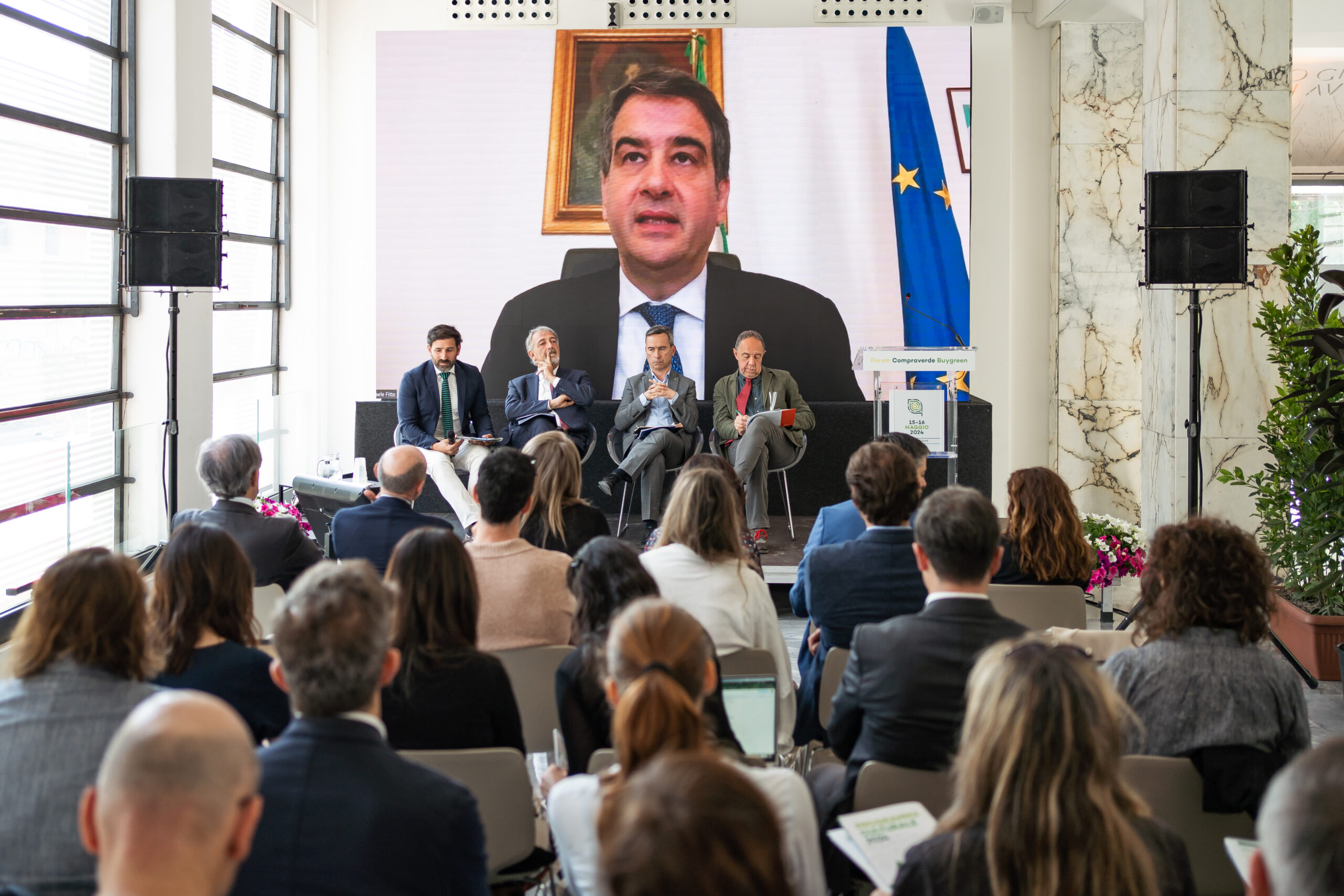Changing course and accelerating the low-carbon transition in the European Union Public procurement (today responsible for 15 per cent of GDP and 10 per cent of the EU’s entire carbon footprint) can play a key role in achieving climate neutrality. How? By purchasing lower-emission products, thereby generating a flywheel effect to support the transition of European companies to a low-carbon economy, generating socio-economic benefits for the citizens of member states.
With this premise, the Forum Compraverde Buygreen kicked off today in Rome: the reference event in Italy and Europe for public and private green procurement policies, projects, goods and services promoted by Fondazioni Ecosistemi.
During the opening conference of the Green Procurement General Assembly, a study – Buy European and sustainable Act – was shown, according to which if the European Union were to adopt criteria setting a cap on climate-changing emissions in public purchasing of heavy materials, vehicles and food in the first 100 days of the new Parliament, a significant reduction in CO2 equivalent emissions would be achieved. Furthermore, if a criterion on the European origin of these products were also introduced, there would also be significant results in terms of local employment and investment, thus helping the European economy to strengthen itself even against major competitors such as China and the United States.
This is a necessary strategy so that Europe’s citizens are not only exposed to the costs of the ecological transition at this stage but can also enjoy additional socio-economic benefits with respect to climate change mitigation, which for many still seems a distant goal.
ITALY AND THE CARBON FOOTPRINT OF PROCUREMENT
In particular, the paper shows that if Italy had decided to align its public procurement criteria with the parameters of the Paris Agreement to reduce greenhouse gas emissions from 2019, we would today have a 5.8 per cent reduction in the carbon footprint of Italian public procurement. Furthermore, adopting these criteria would have allowed EUR 8 billion of public procurement spending to be reallocated to support virtuous activities within Italy, generating significant investments in all the sectors analysed.
Supporting, through public procurement, lower-emission activities in high-impact sectors such as construction, transport and catering, in Italy, as in the rest of Europe, would have fostered the growth of innovative and competitive companies in international decarbonisation-oriented markets, thus giving the industry the visibility needed to make significant investments in favour of the low-carbon transition.
Finally, significant benefits would also have accrued in terms of employment, a key element in making the green transition desirable as well as necessary and in redistributing the costs and benefits of the transition more equitably. In fact, Besa would have created many jobs in Italy, around 31,000, of which 6% would correspond to additional jobs relocated (or re-localised) to Europe from other geographical areas.
THE SITUATION IN EUROPE
On average, EUR 86 billion would be mobilised through Besa each year for the promotion of ‘green’ activities through European public procurement. This includes an increase in annual sales of EUR 6 billion for EU companies and an improvement in the European trade balance.
Likewise, Besa could create many green jobs in the EU, averaging 384,000 over the years analysed. Eight per cent of this total (30,000 jobs) would correspond to relocated jobs that are additional at EU level. The development of these green jobs is essential for job security in the EU in a context of transition towards carbon neutrality.
THE TWO-DAY FORUM
The Forum – taking place today and tomorrow in Rome – brings together every year the main national and international players involved in the dissemination and implementation of sustainable procurement of goods and services and in the construction of development models consistent with the European challenges of the Case Green and ecological transition.
Many themes will be addressed in the various panels scheduled for this 18th edition: with the numerous guests, innovative projects of environmental education, social and human rights in procurement, the impact of collective catering, green hospitals, sport and sustainability will be discussed, up to tackling the unfair practices of green and social washing, enhancing good practices for communicating sustainability and addressing the issue of climate change.
The protagonists of the Forum will also include city administrators, who, together with the network of mayors, will propose new initiatives aimed at ensuring peace, safeguarding social and human rights, and defending environmental commons.
The Forum Compraverde Buygreen enjoys the patronage and participation of the Ministry of the Environment and Energy Security, Regione Lazio, Roma Capitale, in partnership with Legambiente, the Coordinamento Agende 21 Locali Italiane, ALI – Autonomie Locali Italiane and Fairtrade Italia.




